Office of Research & Development |
 |

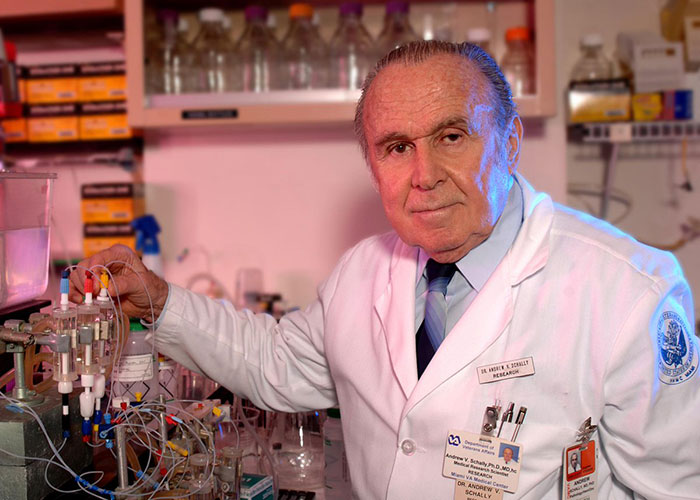
Dr. Andrew V. Schally (Photo courtesy of Miami VA Healthcare System)
November 15, 2018
By Dr. Andrew V. Schally
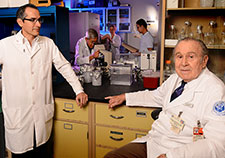
Dr. Andrew Schally (right) is seen in this 2013 Miami VA photo with his former lab manager, Ricardo Rincon. (Photo by Larry Gilstad)
Sixty-one years have passed since I immigrated to the USA from Canada. For 56 of those years, I have had the privilege of being a U.S. citizen. I am writing these remarks feeling a profound satisfaction and gratitude that I have been part of this great nation for more than a half-century. Although my professional achievements were helpful, perhaps instrumental, in bringing me to the USA from Canada as a young postdoctoral scientist, I am profoundly grateful for the great opportunity to live and work in the USA and to be an American. Millions of Americans, particularly the new generation, do not imagine and appreciate how fortunate we are to live in this great country, but I count my blessings every day.
The dastardly attacks of Sept. 11, 2001, shocked me profoundly, but at the same time I was moved and gratified by the outburst of patriotism and awakened pride in the USA that occurred all over this country after these horrific events.
I am an avid student of American history and I worship our founding fathers, namely George Washington and especially Abraham Lincoln. Isn’t this what every good citizen should do? Coming from a military family, I particularly study the heroic achievements of the American armed forces in World War II, in Europe and the Pacific. I deeply admire those men who fought glorious battles in Normandy, Bastogne, Midway, Iwo Jima and so many other places, led by great military commanders such as Eisenhower, McArthur, Patton, Bradley, Nimitz and Halsey. As the late British Prime Minister Winston Churchill said in his speech about the Battle of Midway, “The valor and combat quality of US forces will live forever among the greatest feats in military history.” The inspiration for these great men could be found in the timeless motto of the US Military Academy: “Duty, honor, country.”
"Millions of Americans, particularly the new generation, do not imagine and appreciate how fortunate we are to live in this great country, but I count my blessings every day."
The biggest regret in my life is that I did not have the privilege to serve in the US armed forces. I wish to apologize for it and explain it by the fact that I spent part of World War II as a teenager in Nazi-occupied Europe. Subsequently, I traveled through liberated Italy and France to England and Scotland, where I continued my education. After valuable training in medical research in England, I moved on to Canada, where I received additional schooling and training in endocrinology and higher academic degrees. When I was invited to Houston in 1957 to continue working on the discovery of brain hormones, which I originally made at McGill University in Montreal while I was still a student, I immigrated to the USA. Upon my arrival to Houston, I duly registered with the Selective Service System. After I moved to New Orleans in 1962 and became a professor at Tulane University, I informed the local board of the Selective Service System, which “categorized me in its book of occupational abilities.” Thus, I duly complied with the rules for military service, although I was never called to serve.
Even after all these years, it is difficult to erase this from my mind, and my frustrations about not serving in the military have not disappeared. Does 60 years of hard work compensate for it?
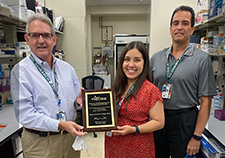
VA center training the next generation of researchers in blood clots and inflammation

AI to Maximize Treatment for Veterans with Head and Neck Cancer
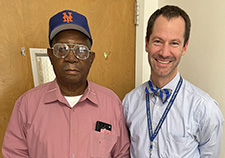
Veterans help find new cancer treatments
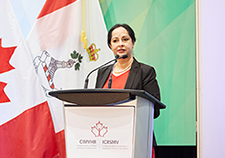
Million Veteran Program director speaks at international forum
These feelings are somewhat assuaged by the wonderful opportunity I have had to serve Veterans. In 1960 I was recruited by VA, then the Veterans Administration, as a consultant in neuroendocrinology and gastroenterology at the Houston VA hospital. Two years later, after becoming a US citizen, I joined VA full time as a medical investigator, at the invitation of VA Central Office, and I was transferred to the VA hospital in New Orleans. With the sagacious support of my VA superiors in Washington, I was able to make major advances in research on the regulation of the endocrine system by the hormonal peptides in the brain and identify their structures.
This work was recognized by top US and Canadian medical awards, and then in 1977 by the Nobel Prize in Medicine or Physiology. The recognition of my discoveries, which have led to life-saving medications with applications for cancer treatment, also brought me coveted membership in the national academies of science or medicine in the USA and five other countries, and over 30 honorary doctorate degrees.
However, the most gratifying prizes spiritually were from AMVETS: the Rehabilitation Award in 1980, and the Silver Helmet award in civil service in 1981. Coming from a Veterans organization, these awards partially alleviated my distress of not serving this great country in the military. I also received from VA the Exceptional Service Award and Medal in 1978, a Lifetime Service to Veterans Award in 2000, and a MeritorioUS Service Award in 2008.
On June 4, 2004, two days before the D-Day commemoration, I received in Paris the Legion D’Honneur (Legion of Honor), Chevalier grade, for contributions to the treatment of patients in France, and for my role in “saving thousands of lives,” as French president Jacques Chirac generously put it. Some 40 days later, during the July 14 Bastille Day ceremonies at the French Consulate in New Orleans, I was introduced to one of the US servicemen, Ensign Marvin J. Perrett, US Coast Guard, one of the coxswains who piloted Higgins landing boats on Utah Beach on D-Day. He was decorated with the Legion of Honor on June 6 in Normandy during the celebrations of the 60th anniversary of D-Day. Both of US were presented to the audience by the French consul. When my turn came to speak, I stated that the US servicemen deserved much more than I to earn the Legion of Honor and that Marvin Perrett was a real hero, and not I. It was a privilege indeed to be in the same class with him, if for only a moment.
After Hurricane Katrina damaged the VA hospital in New Orleans in 2005, I was transferred to the Miami VA Healthcare System. There and at the University of Miami Medical School, I have continued my work on derivatives, or analogs, of brain hormones, which in addition to cancer therapy, have applications in cardiology, diabetes, Alzheimer’s disease and even ophthalmology. These wide applications did not come as a surprise, since these brain hormones, which I helped discover and develop in my earlier career, have a ubiquitoUS distribution in the body and affect many organs and tissues. I am now trying assiduously to improve and extend these applications to promote their development for clinical uses.
I am deeply grateful to the Department of Veterans Affairs for allowing me to serve US Veterans—and, in fact, indirectly the whole nation—by developing new therapies for diseases, such as cancer, that are major national health problems. In addition to discoveries on brain hormones and new therapy for prostate cancer, my legacy will be my substantial number of publications in scientific medical journals, which testifies that I tried to do my best in my work.
I found great satisfaction in the medical research system of the VA, serving U.S. Veterans through my work on new medications for treatment of various diseases.
And now as a good U.S. citizen, I end my reflections with the words of the famous national tune, “God Bless America.”
Dr. Andrew V. Schally, winner of the Nobel Prize in Physiology or Medicine in 1977, has been a VA researcher since 1960. Today he is a Distinguished Medical Research Scientist at the Miami VA Healthcare System and a professor at the University of Miami Miller School of Medicine.
VA Research Currents archives || Sign up for VA Research updates